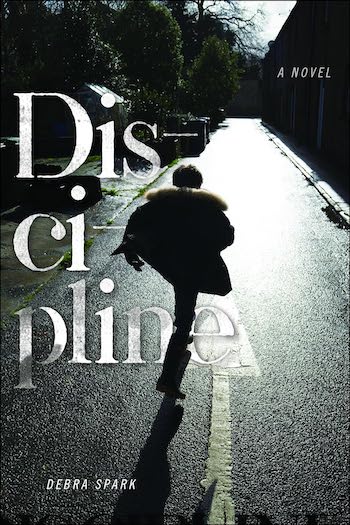Book Review: Debra Spark’s “Discipline” — A Mosaic of Mysteries
By Ed Meek
Debra Spark’s novel Discipline explores thorny questions about the role of art and the nature of truth.
Discipline by Debra Spark. Four Way Books, 306 pages. $19.95.

Debra Spark is the author of a number of novels and short story collections as well as a couple of anthologies. She teaches in the MFA Program at Warren Wilson College and at Colby College.
Her novel Discipline is a mosaic of mysteries.
It begins with an art appraiser, Gracie, who is hired in 2018 to examine a collection of paintings owned by a collector. When she arrives at the house in Maine where the art is stored, she finds that the work the artist is most famous for is missing, presumably stolen. Then the novel jumps back to 1978 and the point of view of a rebellious adolescent boy, Reggie, living with foster parents in a poor urban area. Reggie has a history of “mouthing off” to authorities. When he insults the owners of a restaurant who refuse to serve him, they call the police, and that leads to Reggie being called to the principal’s office. From there, he is turned over to a man who takes him to a “therapeutic boarding school” in remote Maine where Reggie is to be rehabilitated.
The novel moves back and forth in time as it explores various points of view, including, in addition to Gracie’s and Reggie’s, those of the famous artist known for the missing painting, the daughter of the artist, the son of the daughter of the artist, and a man who rescues the daughter of the artist and the grown-up degenerate son of the daughter of the artist.
Spark focuses on the theme of discipline, and the novel is almost mathematical in the way it ties all of its stories together. And who doesn’t love to read about an art heist? If you are from Boston, you are familiar with the story of the Isabella Stewart Gardner theft in 1990: 13 works were stolen, including a Vermeer, a number of paintings by Rembrandt, and a few by Degas. The case was never solved. There’s still a 10-million-dollar reward!
Spark is adept at writing from the point of view of the novel’s women characters; artists and art lovers will enjoy the art talk. The other discipline examined concerns the boarding school. It is based on an actual boarding school called Élan that used a disreputable version of “attack” therapy to demean and break down troublesome boys and girls. Among the strategies: making the kids sing “Mary had a little Lamb” in front of everyone, or dress up in a chicken costume as punishment, or engage in boxing matches with multiple opponents.
Although the portrait of the school is based on interviews the author did with adults who attended Élan, the novel runs into the problem Tim O’Brien addressed in The Things They Carried when he pointed out the difference between a war story and what makes a good story. The retelling here just doesn’t feel right. Reggie is a sensitive young man who doesn’t fight, drink, or take drugs; somehow he is committed to this horrific school where he is degraded and severely beaten. It’s a little too over-the-top to be convincing.
In a number of places in the novel, including during Reggie’s plight, a character asks, “Can you believe this really happened?” You might find yourself thinking to yourself, “No, I can’t.” In addition, Spark has a bad habit of using deus ex machina to move the plot along. Reggie meets the daughter of the artist by jumping into a cab with her. A character actually shows up out of nowhere on a horse to rescue the daughter of the artist.
Foucault claims in his book Discipline and Punish, “truth isn’t outside power.” He goes on to assert that “power produces knowledge.” Whoever has the power determines what is perceived to be the truth. Thus, the undeniable value, despite its narrative flaws, of Spark’s Discipline, which explores thorny questions about the role of art and the nature of truth, truthiness, and alternate truths in our news and politics. The storyline has the merit of grappling with the manipulation of history and other issues that resonate in these contentious times, when scandalous American Indian boarding schools, lynching stories, and facts about the atrocious behavior of people in the past are uncovered daily.
Ed Meek is the author of High Tide (poems) and Luck (short stories).
